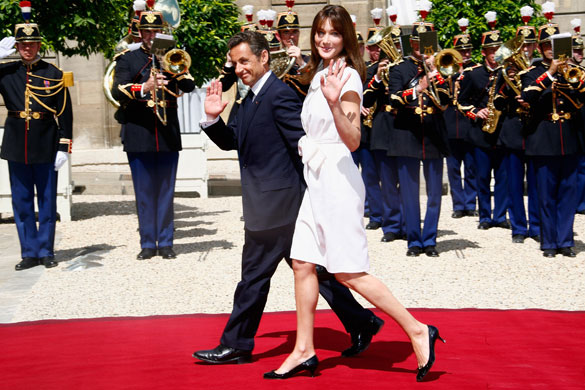If you feel inclined to include pictures of French people in your article, make sure that all of the men are wearing very tight clothing, have mustaches, and, above all, that they have a long cigarette in hand. The women should also be smoking, be abnormally thin, and have a slight hint of armpit hair, barely seen beneath her knee-length dress. And berets. Regardless of gender, berets are a must.
It is advantageous to show only images of the French sitting at a table at an outdoor cafe. You could go the extra mile and show one of the typical gray-skinned french sitting beside and Algerian immigrant if you wanted to be extremely political, and show that you are aware of the country's hot political topics. Even better, you could show an Islamic woman without a burka.
Make sure you talk about the food. It is, after all, the heart and soul of the country. Depict lavish breads, delectable chocolates, and slimy snails (if you can actually find them anywhere) but make sure that you avoid showing anything that could just as easily be found in America. Especially avoid Mac-Do, as Americans would be confused by seeing the restaurant in Paris.
Throughout the book, make sure that you iterate how rude, arrogant, and judgmental the French are. Tell stories of how scandalized you were when a woman refused to give you directions to a popular tourist site or how unappreciative a man was that you country "saved his ass" in World War II. Make sure you mention how you had the feeling that you were always being judged as "the ignorant American."
One of the most important rules however is that you must compare everything to the United States. Make sure you spin it in a light that makes it seem so wrong. Their evil universal healthcare system, their lazy 35 hour work week, their blatant alcoholism for drinking wine with most meals, racist treatment of immigrants, etc. You are, however, allowed to point out that the bread is significantly better. In fact, if you don't mention this, or if you say the contrary, you will likely undermine the credibility of your entire article.

Keep in mind that your readership has no clue about what is going on in French politics. Take this opportunity to explain the strangeness of having so many viable political parties, socialism in everything government related (you don't need to explain this, socialism stands for itself), and, most importantly, make a point of the fact that President Sarkozy is married to a supermodel. You may also wish to make note of how strangely small the French are.
Don't bother talking about anything regarding films or literature. All of the good movies in France are just French-dubbed versions of all the good American films anyway. You can mention a couple bits of music, but only if it is rap and partially in English. You have a pretty good chance with having people enjoy some of MC Solaar's raps.
Finally, make sure you end by talking about how wonderful it was sitting at a cafe in the evening, sipping on some fancy wine and watching the sun set over Paris, bathing the ancient buildings in a soft light, the Seinne glowing slightly, as as the Eiffel Tower lights up for the night.
